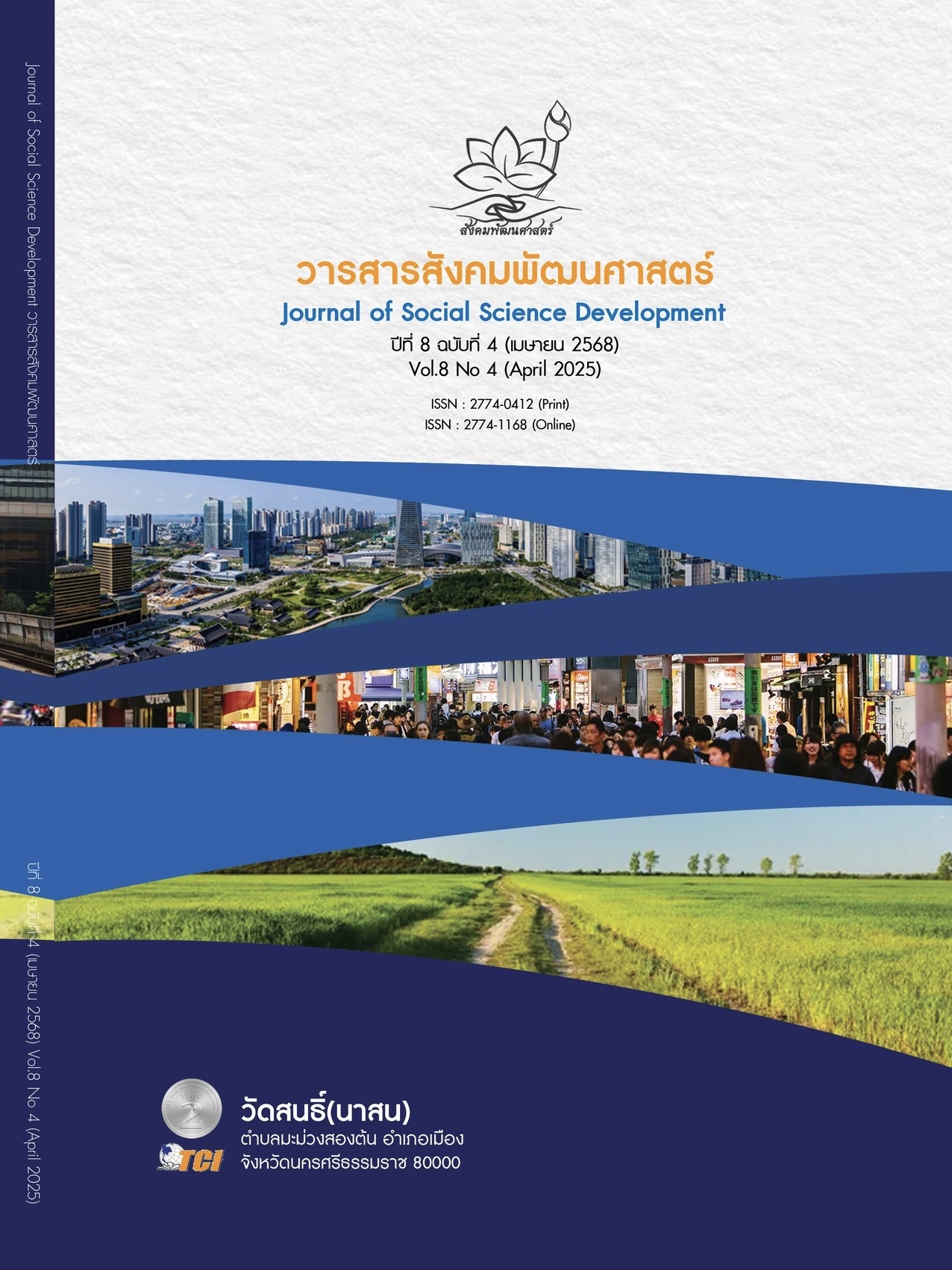MOTIVATION FACTORS INFLUENCING EMPLOYEE LOYALTY AT CAPRIC (THAILAND) CO., LTD.
Main Article Content
Abstract
The objective of this research was to study employee motivation, employee loyalty, motivational factors influencing employee loyalty, and supportive factors affecting employee loyalty. This study employed a quantitative research methodology. The sample group consisted of 189 permanent employees of Cabric (Thailand) Co., Ltd., selected through purposive sampling. The research instrument used was a questionnaire. Data were collected using the questionnaire, and statistical analyses included percentage, mean, and multiple regression analysis.The findings revealed that the majority of employees were female, aged 30 years or younger, held an educational level below a bachelor's degree, and were in officer-level positions, primarily working in the warehouse and logistics department. Most had a monthly income of less than 15,000 baht and had work experience of 1 to 3 years. Employee motivation—regarding job characteristics, achievement, responsibility, recognition, and career advancement—was, overall, rated at a highly significant level. Overall employee loyalty was rated at a high level of agreement. Motivational factors—specifically job characteristics, recognition, and career advancement—had a statistically significant effect on employee loyalty at the .05 level. Supportive factors were also found to be highly important overall and had a statistically significant influence on employee loyalty at the .05 level.
Article Details

This work is licensed under a Creative Commons Attribution-NonCommercial-NoDerivatives 4.0 International License.
References
เกียรติ บุญยโพ. (2562). การสร้างแรงจูงใจในพนักงานเพื่อความพึงพอใจในองค์การ. วารสารวิทยาลัยสงฆ์นครลำปาง, 8(1), 237-250.
ชัชพร มานะกิจ. (2560). แรงจูงใจที่มีผลต่อความจงรักภักดีต่อองค์การของพนักงานธุรกิจค้าปลีกสินค้าอุปโภคและบริโภคในรูปแบบซูเปอร์มาร์เก็ต. ใน สารนิพนธ์วิทยาศาสตรมหาบัณฑิต สาขาวิชาการจัดการทรัพยากรมนุษย์. มหาวิทยาลัยศรีปทุม.
ซายเมียวมิ้น และสุธรรม พงศ์สำราญ. (2567). แรงจูงใจที่มีผลต่อความจงรักภักดีต่อองค์การของพนักงานนิคมอุตสาหกรรมอมตะซีตี้ จังหวัดระยอง. วารสารมหาจุฬานาครทรรศน์, 11(1), 260-270.
พรนิภา ชาติวิเศษ. (2557). แรงจูงใจในการทำงานที่ส่งผลต่อความจงรักภักดีต่อองค์กรของพนักงานในสถาบันอุดมศึกษาสายสนับสนุน มหาวิทยาลัยเทคโนโลยีราชมงคลอีสาน. ใน สารนิพนธ์บริหารธุรกิจมหาบัณฑิต สาขาการจัดการ. มหาวิทยาลัยเทคโนโลยีราชมงคลอีสาน.
พีรยสถ์ รัตนธรรม และนนท์ สหายา. (2564). ปัจจัยจูงใจที่มีผลต่อความจงรักภักดีของพนักงานต่อองค์กร: กรณีศึกษาบริษัท เอบีซี จำกัด. วารสารวิทยาลัยพาณิชยศาสตร์บูรพาปริทัศน์, 16(2), 15-31.
มนตรี ศรีวงษ์. (2566). ข้อดี-ข้อเสีย ทำงานบริษัทขนาดเล็กVSบริษัทขนาดใหญ่. เรียกใช้เมื่อ 16 มิถุนายน 2566 จาก http://www.thaismescenter.com
ยูริโกะ สินทวี. (2557). ปัจจัยแรงจูงใจในการปฏิบัติงานที่มีผลต่อความจงรักภักดีของพนักงานในบริษัทยาและเครื่องมือแพทย์แห่งหนึ่ง. ใน สารนิพนธ์วิทยาศาสตรมหาบัณฑิต สาขาวิชาการจัดการทรัพย์กรมนุษย์. มหาวิทยาลัยศรีปทุม.
วิชชุลดา มังสั้น. (2563). ปัจจัยที่ส่งผลต่อความจงรักภักดีต่อองค์กรของพนักงานการไฟฟ้าฝ่ายผลิตแห่งประเทศไทย (สำนักงานใหญ่). วารสารมนุษยศาสตร์และสังคมศาสตร์ มหาวิทยาลัยราชพฤกษ์, 6(2), 151-164.
สมคิด บางโม. (2558). องค์การและการจัดการ. (พิมพ์ครั้งที่ 7). กรุงเทพมหานคร: วิทยพัฒน์.
Cronbach, J. (1984). Essentials of Psychological Testing. (4th ed.). New York: Macmillan.
Hoy, K. & Rees, R. (1974). Subordinate loyalty to immediate superior: A neglectedconcept in the study of educational administration. Sociology of Education, 47(2), 274-275.


